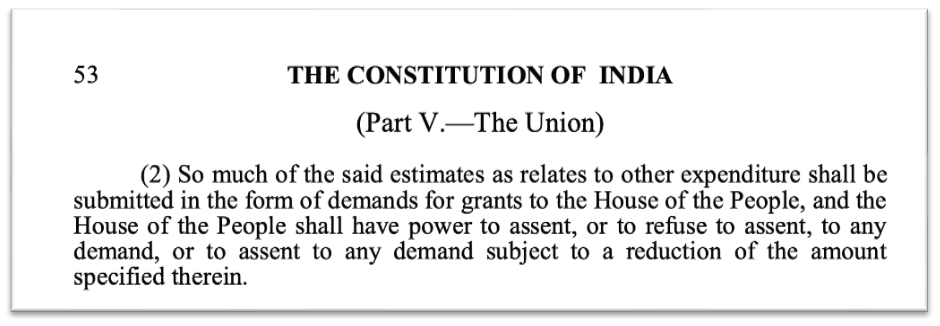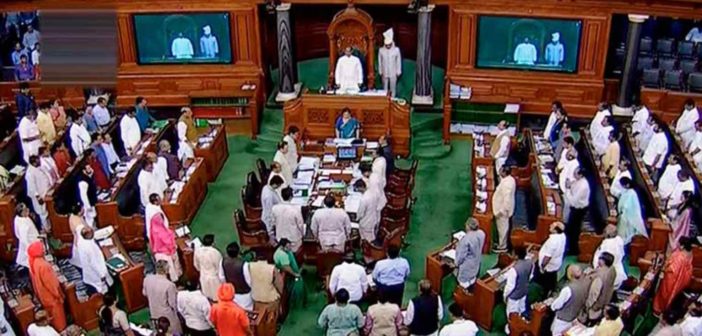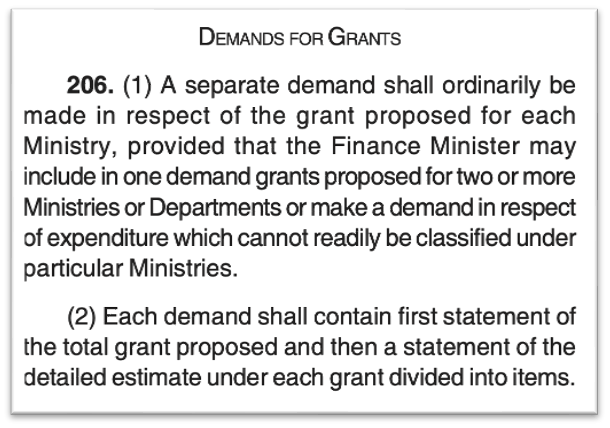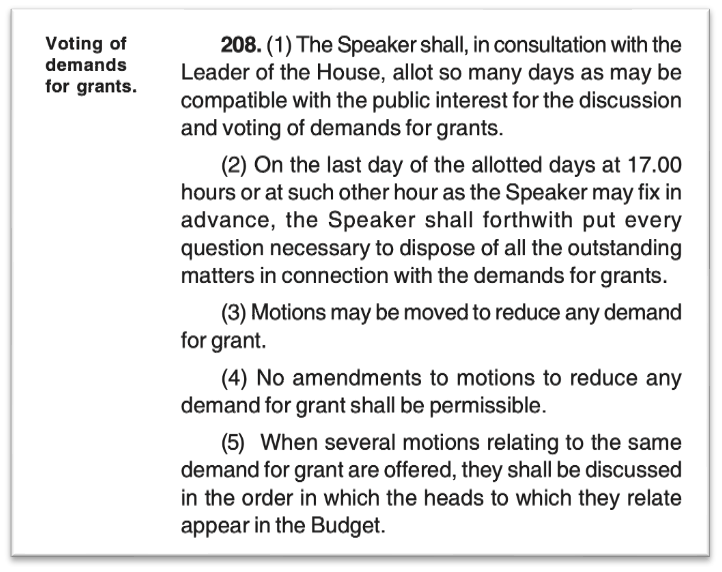During the budget session of the Lok Sabha every year, the ‘Demand for Grants’ of various ministries are taken up for discussion before voting. Only a few ministries are selected for discussion, and from those, only a subset are actually discussed. Here is a deep dive.
Revenue and Expenditure are the two components of a budget. While preparing the annual budget, the Government of India estimates the prospective revenue it is expected to earn during a financial year. This is important to ascertain if it is in a position to meet the expenditure that it is estimated to spend.
Each Ministry/Department in the government is required to estimate the expenditure it is expected to incur in the upcoming financial year. Based on these estimates, the allocation of the funds takes place for the functioning of the ministry and its initiatives.
Article 113 of the Constitution of India mandates that the estimates of expenditure from the Consolidated Fund of India included in the Annual Financial Statement and required to be voted by the Lok Sabha are submitted in the form of “Demand for Grants”.

Every ministry puts forth its ‘Demand for Grants’ to be presented as part of the Annual Budget. This has to be presented only with the prior approval of the President of India. The demand for grants includes charges and voted expenditures.
Charged expenses like interest payments, are regarded as the liabilities of the government of India and are not up for vote in Lok Sabha. Whereas, voted expenditure consists of revenue and capital expenses that would be part of a government plan in the upcoming fiscal year.
Typically, each ministry submits one demand for grant. However, multiple demands can be submitted. Lok Sabha then decides to hold a detailed discussion on a few of these demands for grant. The ministries identified for the discussion vary each year and are decided by the Business Advisory Committee of the Lok Sabha. The discussion on these demands is followed by voting. Demands that have not been discussed and voted on by the last day of the session are guillotined (voted together).
During the voting on ‘Demands for Grant’, MPs can express their disapproval through Cut motions. They can move these cut motions to reduce the grant amount for the respective ministry. After the ‘Demands for Grant’ are passed, they are consolidated into an ‘Appropriation Bill’. This Bill seeks to authorise the Government to spend money from the Consolidated Fund of India.
Here is an analysis of the trends related to the discussions in Lok Sabha on the ‘Demands for Grant’. The information is based on the dataset available on Dataful, which is collated from the information provided in the Ministry of Parliamentary Affairs: Statistical Handbook, 2023. The data is available from 1993.
Since 1993, only about 57% of the Ministries selected were actually discussed
While all the ministries submit their ‘Demand for Grants’, only a few of them are selected to be discussed in the Lok Sabha. While there are no specific criteria for this selection, they are identified based on what the government considers to be important to be discussed.
Since 1993, a total of 155 ‘Demands for Grant’ of ministries have been selected for discussion in Lok Sabha. The highest number of ministries taken up for discussion was during the 1995 budget session with 8 ministries followed by 7 each in 1997 and 2023.
On 10 occasions, 6 ministries were selected for discussion. The least number of ministries selected for discussion was in 2002, when only 2 ministries were selected for discussion. However, it is important to note that not all the ministries that are selected for discussion are actually discussed. Out of the 155 ‘Demands for Grant’ since 1993 there were selected to be discussed, only 88 discussions actually took place. On 6 occasions, none of the ministries selected for that year’s budget were discussed. During 1998, 1999, 2004, 2013, 2018 & 2023, the ‘Demands for Grant’ for submitted to vote without discussion and were voted in full without any discussion.
On the other hand, all the ministries selected were discussed on 9 occasions. During 2009 and 2015, all the 6 ministries selected were discussed. These two years along with 1997, when 6 out of 7 selected ministries were actually discussed, is the highest number of ministries discussed in a particular year’s budget.
‘Demand for Grant’ of Home Ministry selected the highest number of times for discussion
‘Demand for Grants’ of 45 different ministries has been taken up for discussion since 1993. Out of these, 21 Ministries were selected for discussion only once. A few such ministries include – Atomic Energy, Education, Energy, New & Renewable Energy, Panchayat Raj, Petroleum & Natural Gas etc. Demand for Grants from 14 ministries was selected twice for discussion.
Urban Development ministry was selected for discussion only once, in 2012. However, there were 2 other instances of Housing and Urban Affairs and another instance of Housing and Urban Poverty Alleviation selected for discussion. For analysis, all these are categorised under the Ministry of Housing and Urban Affairs.
The greatest number of discussions were for the Ministry of Home Affairs with 16. Agriculture and Defence are the ministries whose demand for grants was selected for discussion the next highest number of times with 13 and 12 respectively. External Affairs, Rural Development, and Human Resource Development are a few of the other ministries whose Demand for Grants were selected more frequently for discussion.
Out of the 16 times the demand for grants of Home Ministry was selected for discussion, it was actually discussed only 10 times. In the case of the Ministry of Agriculture, the discussion was taken up for discussion 8 times. In the case of Defence ministry, the actual discussion took place only on 4 occasions despite being selected for discussion 12 times.
A few ministries like Energy, Panchayat Raj, Petroleum and Natural Gas, Culture, etc were not taken up for discussion, even though they were selected for discussion.
With nearly 15 hours, discussion related to Defence in 1995 was for the longest duration
There were 6 instances when the duration of a discussion went beyond 10 hours. Here is a snapshot of the duration of the discussions.
- The longest among these discussions on ‘Demand for Grants’ was the one related to the Ministry of Defence in 1995. The discussion which happened across 6 days during May 1995 went on for 14 hours 49 minutes.
- The next three longest discussions were related to Railways. While the longest was for 13 hours 6 minutes, the next was one minute short of 13 hours. It ought to be noted that, since 2017, the Railway Budget was merged into the General Budget. Except for 2018, when all the Demands for Grants were voted in without discussion, the discussion on Railways lasted for longer durations each year. The least being 9 hours 21 minutes in 2021.
- In 1997, Demand for grants relating to Coal, Non-conventional energy sources, Power and Atomic Energy were discussed together for a duration of 5 hours and 9 minutes.
- The shortest duration of discussion was 44 minutes for Science and Technology in 2005. Another discussion of this ministry in 2007 was for a longer duration with over 4 hours. The discussion on the Demand for Grants of the Ministry of Social Justice & Empowerment in 2014 also took less than an hour.





